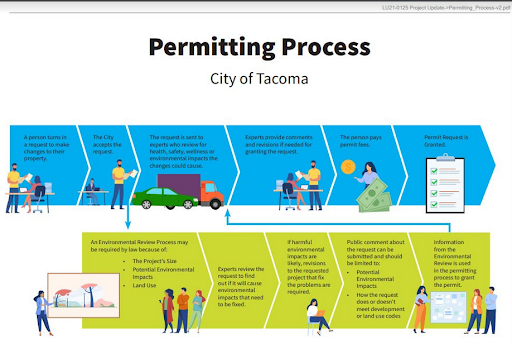by Michelle Mood
Alert! Alert!
The City of Tacoma Planning and Development Services Department has a chance to reduce health inequity and environmental injustice in South Tacoma!
Will they go for it?
Let’s look at the permitting process schematic presented to City Mayor Woodards and City Council this past summer —

This is the permitting flow chart for Bridge Industrial’s planned 2.5 million square feet warehouse in South Tacoma (“LU21-0125”). Look at the top, blue sections, at the fourth blue block, when “experts provide comments and revisions if needed for granting the request.”
Well, the experts did – the US Environmental Protection Agency Region 10 (EPA), State of
Washington Department of Ecology (DOE), State of Washington Department of Health (DOH), and
the Tacoma-Pierce County Health Department (TPCHD) all sent letters with forceful requests for revision. The really big “ask” from all these agencies was to address concerns about health impact on the community, about the risk of deepening health inequities in South Tacoma, about the opportunity to improve environmental justice and to include the community in planning. The EPA, the DOH, and the TPCHD also all asked for an intensive, intermediate-level Health Impact Assessment (HIA).
Specifically, the EPA recommends that “the SEPA analysis…include a more robust analysis of the project’s impacts to communities with Environmental Justice concerns… EPA is concerned that the project development will further exacerbate a historically over-burdened community.” The State of Washington Department of Health asks the city to “include a justice-focused” approach and “reduce health disparities by promoting environmental justice.“
The State of Washington Department of Ecology notes that Health Equity and Accountability Law is “now a statutory obligation. There are clear environmental justice concerns with the project.” “Environmental Justice is a high priority. [W]e strive to eliminate environmental and health disparities by prioritizing communities with environmental justice concerns.“
Tacoma-Pierce County Health Department identified the terrible environmental health disparities of the area – it ranks 10/10 — the short lifespan [6 years shorter than county average], low birth weights, high cardiovascular deaths.
Even the Puget Sound Clean Air Agency wrote that “we identify this area as an overburdened community“!
With regards to meaningful community involvement, TPCHD called for the project developers and the City to “determine measures that address [residents’] concerns” using “robust community engagement,” while the EPA gave detailed ways for Bridge Industrial “to discuss plans to meaningfully engage affected communities in decisions about the project.” DOH requested the City “engage stakeholders affected by the
proposal” since “community engagement and empowerment are essential to promoting equity,” while the DOE underscored the importance of public comments (all still ignored by Bridge Industrial). Hundreds of citizens and thirty organizations called for an Environmental Impact Statement, also as yet ignored by the city.
And what has been the city’s response? The Planning officials told Bridge Industrial to respond to agency comments, “of particular note: the analysis of mobile source emissions” (exhaust from cars and trucks’). That’s it.
Well, it’s true that the US EPA, WA DOE, WA DOH and TPCHD did mention the fact that, even after three submissions of revised permitting materials, Bridge Industrial had not yet included actual use of the warehouse by vehicles. Absolutely no mobile (vehicle) source of emissions had been modeled and assessed for impact. I’m certainly in favor of that, although I’m also raising my eyebrows at the fact that the third resubmission still didn’t bother to get up to speed on that request.
But what about ways to enact the Healthy Environment for All(HEAL) Act? What about a Health Impact Assessment? Environmental justice and community inclusion? Remarkably, all these suggestions were phrased in strong, imperative language:
“strongly recommend additional analysis,” “we want to make sure you are aware,” “this process should be more comprehensive than a desktop HIA,” “actively engaging the community, developer and city will be critical,” “it is imperative to plan for the future,” “risk … from multiple environmental hazards,” “these communities face significant environmental disparities,” “based on the size and scale of the project and the historic context of the community, conduct additional analysis to better understand the full range of impacts to the community.“
Let’s go back to the graphic the City Manager’s office presented on Bridge Industrial’s permitting process.
Note how the permitting process goes straight to “permit request is granted”? There’s no hint that the permitting process could lead to a denial of the permit even though that’s a legal option.
Makes you stop and think.
This part of the city has the poorest population with the highest proportions of Black, Hispanic, mixed-race and immigrant populations in the city. People here have the highest levels of poverty and illness and the lowest life expectancies in the city. They are also living in the old redlined areas, a legacy of Tacoma’s racist past, with today’s zoning laws replicating environmental racism. The City has a great chance to reduce health inequity, uplift seriously overburdened South Tacomans, and improve environmental justice.
Will they?
Repeated requests for clarification from the Planning and Development Services department led to no details about the City’s next actions, although staff emailed back the general admission that “the City retains Lead Agency Authority and all SEPA decisions remain with the City…. Because these are development permits, the lead department is PDS and the SEPA Official is Peter Huffman.” Detailed questions about why the Lead Agency has not requested compliance with The HEAL Act, a Health Impact Assessment, and community inclusion were not answered.
Stay tuned! And check out our main page about the proposed mega warehouse for more information: http://www.350tacoma.org/2022/11/21/mega-warehouse-proposed-for-south-tacoma/
